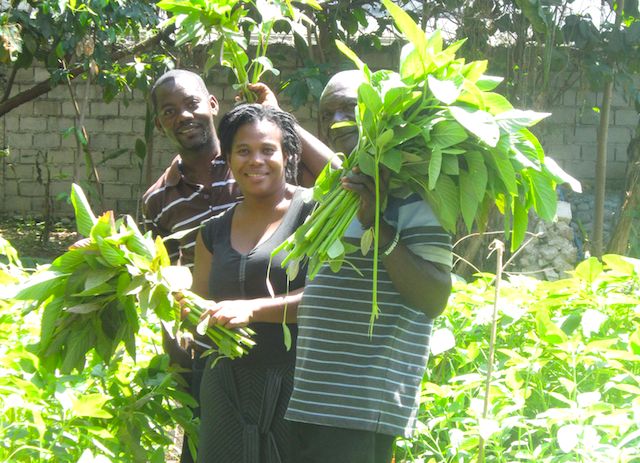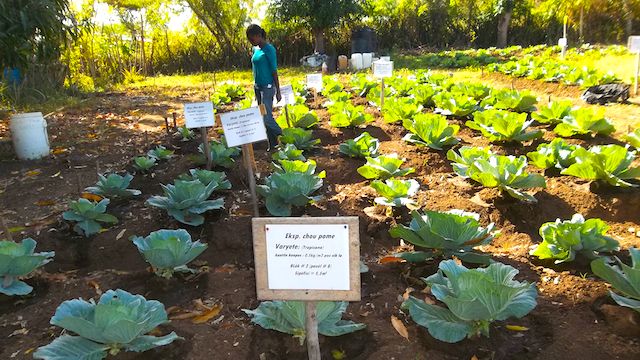- Resource recovery
- Fertiliser, soil conditioner, production of crops
- Composting of excreta and agricultural activities - SOIL's work in Haiti
Composting of excreta and agricultural activities - SOIL's work in Haiti
10.5k views
Re: New photos by SOIL Haiti about reuse of excreta-based compost
- Leah Page, SOIL Development Director
Website: www.oursoil.org
Facebook: www.facebook.com/SOILHaiti
Twitter: @SOILHaiti.
Please Log in to join the conversation.
You need to login to reply- Elisabeth
-
- User is blocked
- Freelance consultant since 2012
Less- Posts: 3372
- Karma: 54
- Likes received: 932
Re: Composting of excreta and agricultural activities - SOIL's work in Haiti
Leah Nevada Page from SOIL Haiti has kindly uploaded some of their beautiful reuse photos to the SuSanA flickr photo database. I had noticed them in their tweets and had suggested to her to also upload them to flickr to make them more easily found by people looking on the internet for photos.
Leah has kindly uploaded some photos now and you can see and admire them in this set:
www.flickr.com/photos/gtzecosan/sets/72157650521069149
You are free to use these photos in your own work to illustrate excreta reuse options in general (please make sure you credit SOIL Haiti for the photo, of course).
I like in particular these four:

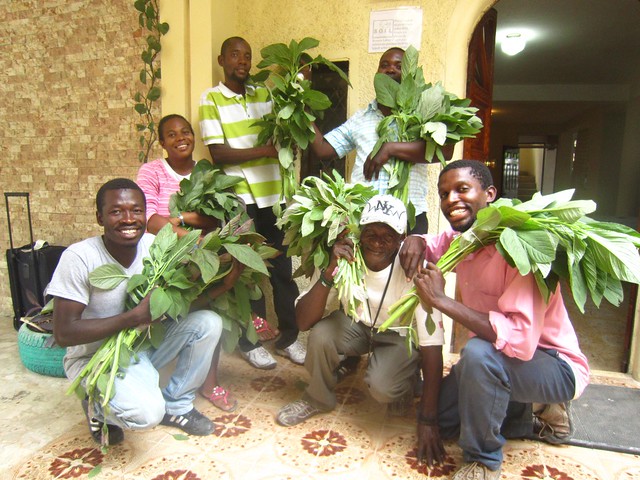

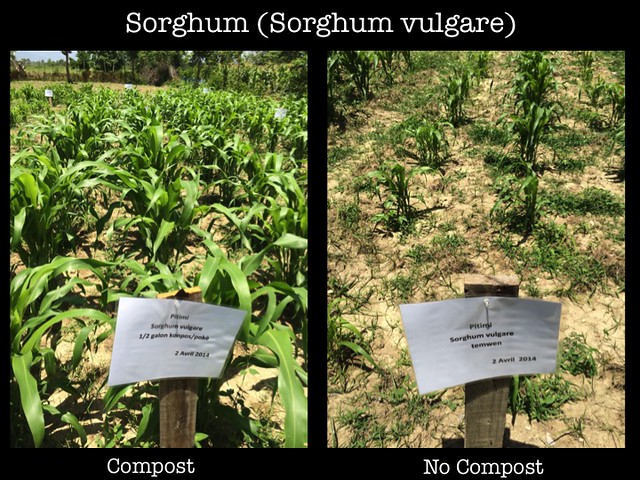
I have used three of these photos also to illustrate the Wikipedia article on reuse of excreta:
en.wikipedia.org/wiki/Reuse_of_excreta
And I have also added a paragraph about their reuse work to the end of the Wikipedia article:
Haiti [edit source | edit]
The NGO SOIL in Haiti began building urine-diverting dry toilets and composting plants in Port-au-Prince as part of the 2010 Haiti earthquake emergency relief effort in northern Haiti.[31] SOIL’s two composting waste treatment facilities currently transform over 20,000 gallons (75,708 liters) of human excreta into safe, organic, agricultural-grade compost every month. The compost produced at these facilities is sold to farmers, organizations, businesses, and institutions around the country to help finance SOIL’s waste treatment operations.[32] Crops grown with this soil amendment include spinach, peppers, sorghum and maize. Each batch of compost produced is tested for the indicator organism helminth eggs to ensure that complete pathogen kill has taken place during the thermophilic composting process.[citation needed]
This paragraph, and in fact the entire Wikipedia article, is as usual "work in progress" and I invite you all to contribute or to point out things that need to be improved. Thanks.
Thanks again to the staff of Haiti for sharing their experiences! If you also want to follow them on twitter, this is their account: twitter.com/SOILHaiti
Regards,
Elisabeth
P.S. This other forum thread explains a bit more about the mobile toilets that Haiti uses to collect the excreta (generally the toilets are with urine diversion, although the ones at schools are without):
forum.susana.org/forum/categories/52-mob...composting-and-reuse
Freelance consultant on environmental and climate projects
Attachments:
-
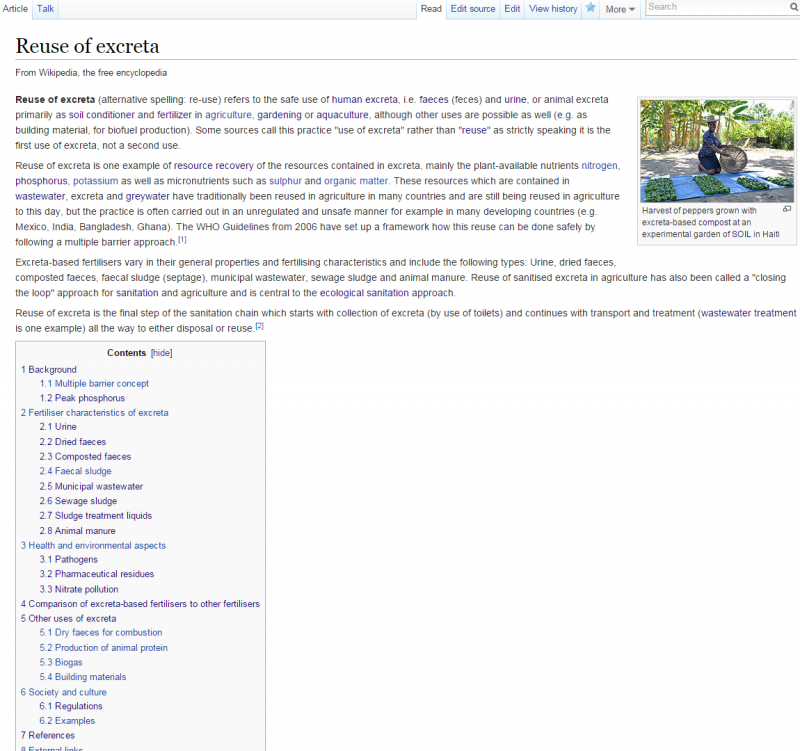 Reuseofexc...edia.png
(Filesize: 297KB)
Reuseofexc...edia.png
(Filesize: 297KB)
Please Log in to join the conversation.
You need to login to replyRe: SOIL Annual Report 2013 - from emergency ecological sanitation to the piloting of social business models to composting and agricultural activities
Thanks for your question. As we discussed on Twitter, SOIL firmly believes that no one solution will solve the sanitation crisis and there is room for many innovations to come to the table. As such, we do not believe that EcoSan alone can be adopted by everyone in Haiti. That said, we believe that there is incredible potential in bringing EcoSan to scale, particularly in urban areas, here in Haiti and abroad. Please feel free to follow our progress on this effort on our blog, www.oursoil.org/blog."
Warm regards,
Sasha
Website: www.oursoil.org
Facebook: www.facebook.com/SOILHaiti
Twitter: @SOILHaiti.
Please Log in to join the conversation.
You need to login to reply- joeturner
-
 Less
Less- Posts: 717
- Karma: 23
- Likes received: 185
Re: SOIL Annual Report 2013 - from emergency ecological sanitation to the piloting of social business models to composting and agricultural activities
I'm interested to know the extent to which you believe that your processes can/could be upscaled and whether you could ever have a nation-scale system.
Please Log in to join the conversation.
You need to login to reply- joeturner
-
 Less
Less- Posts: 717
- Karma: 23
- Likes received: 185
Re: SOIL Annual Report 2013 - from emergency ecological sanitation to the piloting of social business models to composting and agricultural activities
And, for me, this is the problem: if people in general hear that it is possible to safely compost faeces and grow cabbages in it, then those who are not taking the care and doing the batch testing that SOIL may also think that their faeces compost is safe.
I think the responsible advice to everyone is that additional barriers are necessary to ensure risk transfer is reduced to the minimum possible. I think this means regular monitoring and management of compost, provision of safety equipment and training of workers, and care in the use of the compost. If batch pathogen testing of the compost is not available, leafy vegetables should not be grown in the compost.
I would not give my family raw food that has been grown in faeces compost. I would much rather use the faeces compost to grow some other green crop to harvest and compost and use that on a food crop to add an extra barrier to pathogen transfer.
Please Log in to join the conversation.
You need to login to replyRe: SOIL Annual Report 2013 - from emergency ecological sanitation to the piloting of social business models to composting and agricultural activities
There is a risk that the use of SOIL's compost will encourage other reuse of composted human waste which may not have been produced under controlled conditions and could pose a health risk. In our outreach we try to be clear about only using compost that has been tested for pathogens on leafy vegetables.
SOIL will continue to monitor our compost for safety and encourage users to use human waste compost responsibly. We also encourage good risk management in food preparation and support national messaging that all vegetables should be washed with treated water prior to being eaten raw. We appreciate your vigilance and would love to have more information on regulations about the application of human waste compost worldwide.
Our staff are our most enthusiastic customers for leafy vegetables from the SOIL garden and we have had no complaints of sickness. We take great care at the compost site and have confidence in our product. That said, we can understand and respect your hesitancy about having it on your own vegetables.
Thanks again for sharing your thoughts on this.
Take care, Sasha
Website: www.oursoil.org
Facebook: www.facebook.com/SOILHaiti
Twitter: @SOILHaiti.
Please Log in to join the conversation.
You need to login to reply- joeturner
-
 Less
Less- Posts: 717
- Karma: 23
- Likes received: 185
Re: SOIL Annual Report 2013 - from emergency ecological sanitation to the piloting of social business models to composting and agricultural activities
In the UK, I think you wouldn't be able to grow cabbages or lettuce in it until after it had been spread on the soil for 12 months.
Personally, I don't think I would grow cabbages or lettuce in it at all ever.
Please Log in to join the conversation.
You need to login to replySOIL Annual Report 2013 - from emergency ecological sanitation to the piloting of social business models to composting and agricultural activities
Please log in or register to see it.
Website: www.oursoil.org
Facebook: www.facebook.com/SOILHaiti
Twitter: @SOILHaiti.
This message has an attachment file.
Please log in or register to see it.
Please Log in to join the conversation.
You need to login to reply- Resource recovery
- Fertiliser, soil conditioner, production of crops
- Composting of excreta and agricultural activities - SOIL's work in Haiti








